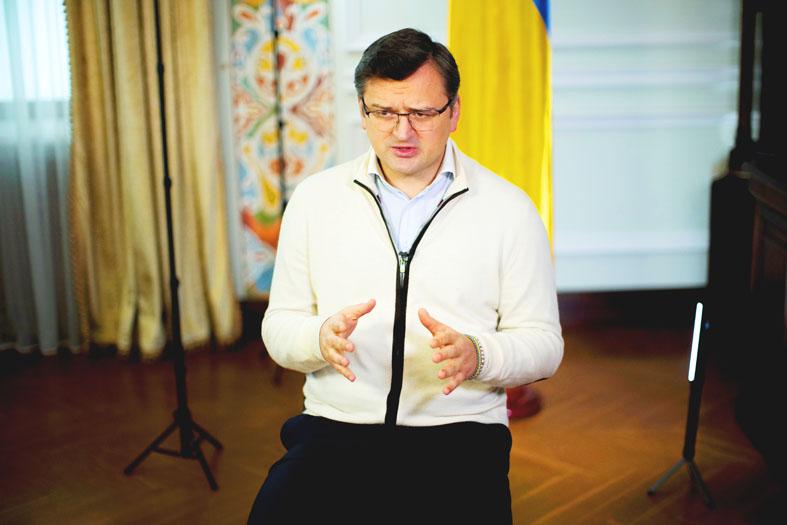Ukrainian Minister of Foreign Affairs Dmytro Kuleba has asked China to provide security guarantees for Kyiv, in a lengthy interview containing some of the most direct criticisms of Moscow published by Beijing’s state media.
Western powers and Ukraine have repeatedly urged China to condemn Russia’s invasion as it tries to maintain a supposedly neutral stance, with the US threatening consequences if Beijing provides military or economic support to Moscow.
“Ukraine is studying the possibility of acquiring security guarantees from permanent members of the UN Security Council, including China, and other major powers,” Kuleba was quoted as saying by Xinhua news agency on Saturday.

Photo: AP
“We propose that China becomes one of the guarantors of Ukraine’s security, this is a sign of our respect and trust in the People’s Republic of China,” Kuleba added.
China in 2013 pledged to provide Ukraine with “security guarantees” if it was invaded or threatened with nuclear attack, but appeared evasive on the same issue in the wake of Russia’s invasion on Feb. 24.
Asked about the guarantee last month, a Chinese Ministry of Foreign Affairs spokesman suggested that such “security assurances have clear limitations on the content and are triggered under specific conditions,” in reference to a similar UN security resolution on non-nuclear states.
Chinese officials have often blamed NATO for provoking Moscow’s invasion and accused the West of escalating the conflict by sending weapons to Ukraine.
Beijing’s state media has also repeatedly amplified Russian propaganda surrounding the war and largely avoided attributing Ukrainian civilian deaths to Moscow’s military aggression.
Kuleba has only had two calls with Chinese Minister of Foreign Affairs Wang Yi (王毅) since the invasion, while Wang met Russian Minister of Foreign Affairs Sergey Lavrov in China last month and reiterated that cooperation between the two countries has “no limits.”
In the Xinhua interview, Kuleba also accused Russia of having “compromised” Beijing’s Belt and Road Initiative, saying that the consequences of the global food security crisis would threaten China’s economy.
“We also believe that this war is not in China’s interests,” he was quoted as saying.
His remarks directly referred to Russia’s actions as an “invasion” — a term that Chinese officials and state media have sought to avoid.
“The situation is not escalating because of Ukraine. We are exercising our right to defend ourselves,” he said, in an apparent rebuff of Chinese warnings against other states providing arms to Kyiv.
While Chinese President Xi Jinping (習近平) has not yet spoken publicly with Ukrainian President Volodymyr Zelenskiy, he called Russian President Vladimir Putin the day after the invasion.

A French-Algerian man went on trial in France on Monday for burning to death his wife in 2021, a case that shocked the public and sparked heavy criticism of police for failing to take adequate measures to protect her. Mounir Boutaa, now 48, stalked his Algerian-born wife Chahinez Daoud following their separation, and even bought a van he parked outside her house near Bordeaux in southwestern France, which he used to watch her without being detected. On May 4, 2021, he attacked her in the street, shot her in both legs, poured gasoline on her and set her on fire. A neighbor hearing

DEATH CONSTANTLY LOOMING: Decades of detention took a major toll on Iwao Hakamada’s mental health, his lawyers describing him as ‘living in a world of fantasy’ A Japanese man wrongly convicted of murder who was the world’s longest-serving death row inmate has been awarded US$1.44 million in compensation, an official said yesterday. The payout represents ¥12,500 (US$83) for each day of the more than four decades that Iwao Hakamada spent in detention, most of it on death row when each day could have been his last. It is a record for compensation of this kind, Japanese media said. The former boxer, now 89, was exonerated last year of a 1966 quadruple murder after a tireless campaign by his sister and others. The case sparked scrutiny of the justice system in

DITCH TACTICS: Kenyan officers were on their way to rescue Haitian police stuck in a ditch suspected to have been deliberately dug by Haitian gang members A Kenyan policeman deployed in Haiti has gone missing after violent gangs attacked a group of officers on a rescue mission, a UN-backed multinational security mission said in a statement yesterday. The Kenyan officers on Tuesday were on their way to rescue Haitian police stuck in a ditch “suspected to have been deliberately dug by gangs,” the statement said, adding that “specialized teams have been deployed” to search for the missing officer. Local media outlets in Haiti reported that the officer had been killed and videos of a lifeless man clothed in Kenyan uniform were shared on social media. Gang violence has left

US Vice President J.D. Vance on Friday accused Denmark of not having done enough to protect Greenland, when he visited the strategically placed and resource-rich Danish territory coveted by US President Donald Trump. Vance made his comment during a trip to the Pituffik Space Base in northwestern Greenland, a visit viewed by Copenhagen and Nuuk as a provocation. “Our message to Denmark is very simple: You have not done a good job by the people of Greenland,” Vance told a news conference. “You have under-invested in the people of Greenland, and you have under-invested in the security architecture of this